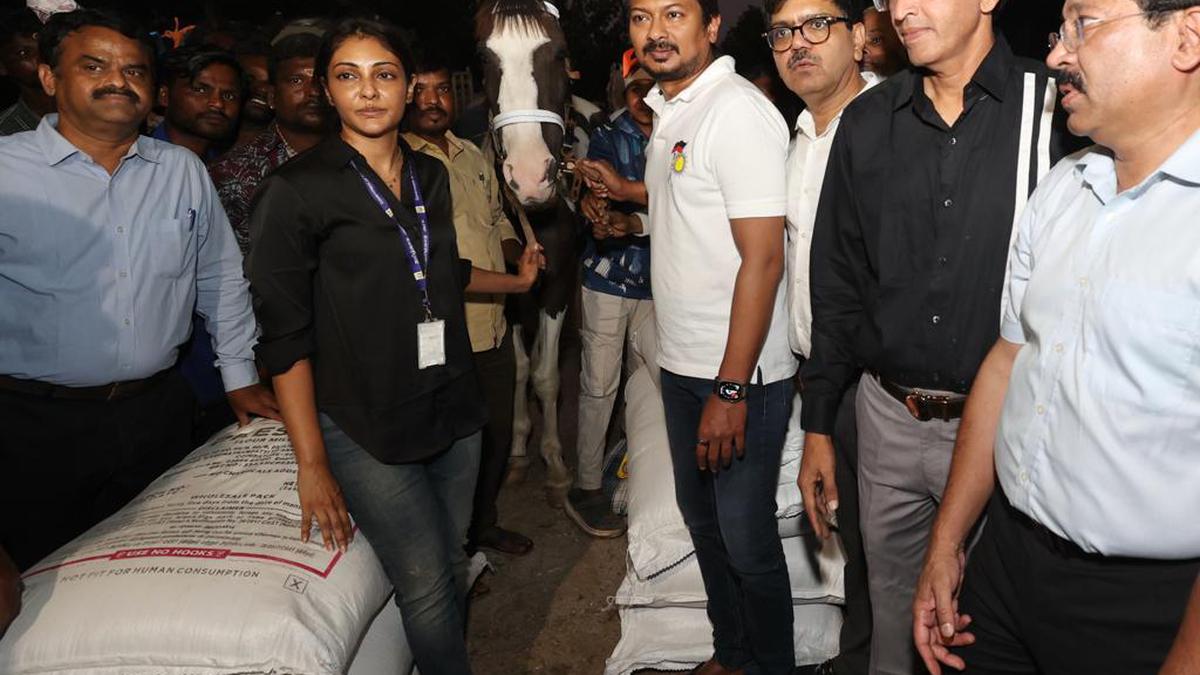
Animal Welfare Board provides relief materials to beach horses and horse owners
The Hindu
Tamil Nadu Animal Welfare Board organizes relief camp for horses & owners after cyclone-induced heavy downpour.
The Tamil Nadu Animal Welfare Board (TNAWB) organised a relief camp for horses and horse owners in the aftermath of cyclone-induced heavy downpour that brought the city to a standstill.
Led by Minister of Youth Welfare and Sports Development and Chepauk MLA Udhayanidhi Stalin, the Board on Wednesday distributed 136 kg of horse food each to around 200 horses used commercially in Triplicane, Chepauk, Besant Nagar, Ripon Building, and Lighthouse. “A total of 27,200 kg of horse food was given. For each horse, it will last for a month,” said Shruti Vinod Raj, member of the TNAWB.
Mr. Udhayanidhi gave out rice, groceries, and bedsheets to the owners of the horses.
During the camp, veterinarians from the Tamil Nadu Veterinary and Animal Sciences University conducted a health check-up for the horses.
Days after the city was flooded as a result of rainfall, the TNAWB distributed 2,500 kg of dry food to registered non-governmental animal welfare organisations and individual feeders on December 7 and 8.
In addition to conducting 93 medical camps for animals to prevent disease outbreaks, the TNAWB is also in the process of procuring 6,000 kg of dry cat and dog food with plans to distribute it to individual feeders in the coming week, said Ms. Raj in a release.

Hampi, the UNESCO-recognised historical site, was the capital of the Vijayanagara empire from 1336 to 1565. Foreign travellers from Persia, Europe and other parts of the world have chronicled the wealth of the place and the unique cultural mores of this kingdom built on the banks of the Tungabhadra river. There are fine descriptions to be found of its temples, farms, markets and trading links, remnants of which one can see in the ruins now. The Literature, architecture of this era continue inspire awe.

Unfurling the zine handed to us at the start of the walk, we use brightly-coloured markers to draw squiggly cables across the page, starting from a sepia-toned vintage photograph of the telegraph office. Iz, who goes by the pronouns they/them, explains, “This building is still standing, though it shut down in 2013,” they say, pointing out that telegraphy, which started in Bengaluru in 1854, was an instrument of colonial power and control. “The British colonised lands via telegraph cables, something known as the All Red Line.”

The festival in Bengaluru is happening at various locations, including ATREE in Jakkur, Bangalore Creative Circus in Yeshwantpur, Courtyard Koota in Kengeri, and Medai the Stage in Koramangala. The festival will also take place in various cities across Karnataka including Tumakuru, Ramanagara, Mandya, Kolar, Chikkaballapura, Hassan, Chitradurga, Davangere, Chamarajanagar and Mysuru.








